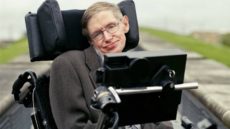 The staff and trustees of Humanists UK have expressed their sadness at the death of the theoretical physicist, cosmologist, science communicator, and humanist Professor Stephen Hawking.
The staff and trustees of Humanists UK have expressed their sadness at the death of the theoretical physicist, cosmologist, science communicator, and humanist Professor Stephen Hawking.
Stephen Hawking was the world’s most famous living scientist, and some of his contributions to human understanding rank alongside the discoveries of history’s greatest thinkers. He is perhaps best known for his longtime collaboration with fellow physicist (and Humanists UK patron) Sir Roger Penrose, which furthered the theory of general relativity first proposed by Albert Einstein.
Their thinking and experimentation helped to enrich human understanding of the early universe, for which the pair won a Wolf Prize in 1988. An exemplary scientist, Hawking was committed to challenging his own ideas, and later published papers questioning his own discoveries in light of quantum mechanics. Hawking was also known for his theoretical prediction that black holes expelled powerful radiation, dubbed Hawking Radiation.
One aspect of Hawking’s life and public persona was his health difficulties; he was first diagnosed with a rare, slow-progressing form of motor neurone disease while a postgraduate student at the University of Cambridge. Initially given only two years to live, he nevertheless continued to experiment, theorise, and publish in great volume. After outliving this original prognosis, his health continued on a slow decline, and he gradually lost control of his motor functions and power of speech. He became famous the world over for his American-accented computerised speech device, attached to his wheelchair and controlled with his mouth.
Hawking’s fame became greater as his age increased, and he was committed to expanding not only the furthest reaches of human understanding, but the wider public appreciation of science. It was in this capacity that he charitably donated time to numerous BBC and other special projects, such as Red Nose Day. He also took on recurring parts in the sitcom The Big Bang Theory and the animated comedies The Simpsons and Futurama. In these parts he made light of himself and his public reputation to an enormous extent, demonstrating to the world the fierce sense of humour that his friends often spoke of.
He was a committed activist with a strong interest in environmentalist, nuclear disarmament, and global peace campaigns, in part motivated by his sober prediction that humanity would most likely cause its own extinction in the near future. He was determined to avert that outcome. His thoughtfulness about the world also prompted him to be explicit about his atheist and humanist approach to existential and ethical questions, for which he became well-known throughout his career, not without occasional controversy. His reflections on living in a universe that is unguided by any external force, and in which death represented the total end of consciousness, appear recurrently in his writings and public statements.
Hawking’s comments on death and the precious brevity of life perhaps shed light on his own relentless pursuit of science, even in the face of profound ill health:
We are each free to believe what we want and it is my view that the simplest explanation is there is no god. No one created the universe and no one directs our fate. This leads me to a profound realisation. There is probably no heaven, and no afterlife either. We have this one life to appreciate the grand design of the universe, and for that, I am extremely grateful.
He was, in the broadest sense, critical of religion – perhaps more so than his fellow humanist, Roger Penrose. He once remarked, ‘There is a fundamental difference between religion, which is based on authority, [and] science, which is based on observation and reason. Science will win because it works.’ This outlook underlined the fundamental importance of human life. He told the German newspaper Der Spiegel in 1988: ‘We are just an advanced breed of monkeys on a minor planet of a very average star. But we can understand the Universe. That makes us something very special.’
Hawking first became acquainted with the organised humanist movement while pursuing his undergraduate degree in Oxford, where he was a member of the Oxford University Humanist Group, the university chapter affiliated to Humanists UK. When his distinguished career more than warranted his becoming a patron of Humanists UK in the 2000s, he said he was flattered by the invitation but didn’t see himself as a ‘joiner’. He nonetheless maintained his interest in the movement. Even as late in his life as 2017 he was scheduled as the keynote speaker at the Humanists UK annual convention in his home town of Cambridge, but in the event he was not able to attend.
Adding to the many tributes to Professor Hawking from humanists today, Humanists UK Chief Executive and President of the International Humanist and Ethical Union Andrew Copson commented:
‘Stephen Hawking was an inspirational man and a committed champion of good causes for the whole of his life. He knew that life was all too short, and so seized every moment of his to advance what he cared about, whether human knowledge or social justice. His relentless hunger to know the universe better was a gift to us all, for which the world will be forever grateful.’
Notes
For further comment or information please contact Humanists UK’s Director of Public Affairs and Policy Richy Thompson on richy@humanists.uk or 020 3675 0959.
At Humanists UK, we advance free thinking and promote humanism to create a tolerant society where rational thinking and kindness prevail. Our work brings non-religious people together to develop their own views, helping people be happier and more fulfilled in the one life we have. Through our ceremonies, education services, and community and campaigning work, we strive to create a fair and equal society for all.
Read Roger Penrose’s obituary for Stephen Hawking in the Guardian: https://www.theguardian.com/science/2018/mar/14/stephen-hawking-obituary
Humanists UK recently changed its name from the British Humanist Association: https://humanists.uk/2017/05/22/bha-becomes-humanists-uk/
